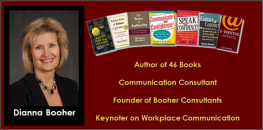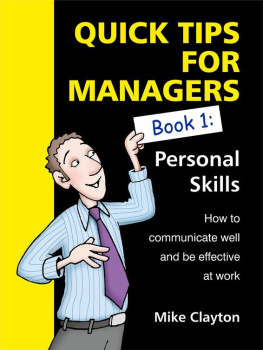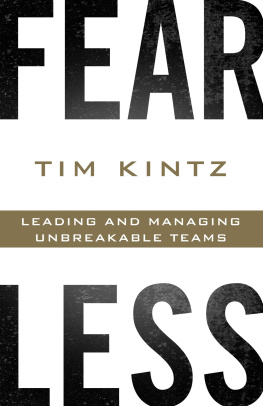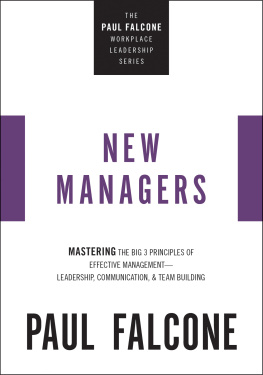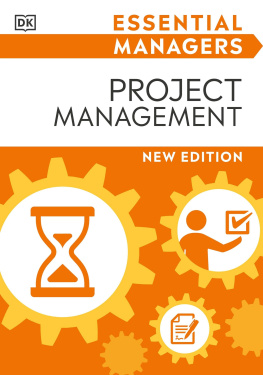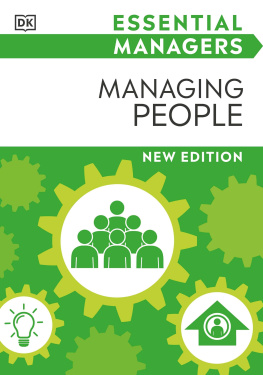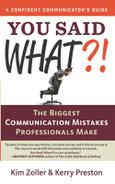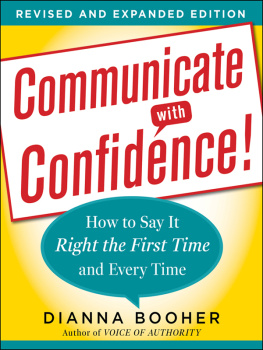Copyright 2013 by Dianna Booher. All rights reserved. Printed in the United States of America. Except as permitted under the United States Copyright Act of 1976, no part of this publication may be reproduced or distributed in any form or by any means, or stored in a database or retrieval system, without the prior written permission of the publisher.
For special discounts on bulk purchases or for workshops and speeches on topics covered in this book, please ontact us at or call 1-800-342-6621.
Communicate With Confidence is a registered trademark of Booher Consultants, LLC.
SEER Format is a registered trademark of Booher Consultants, LLC.
Platinum Rule is a registered trademark of Anthony J. Alessandra.
Chapter 1 - Conversing One on One
The way we communicate with others and with ourselves ultimately determines the quality of our lives.
Tony Robbins
The real art of conversation is not only to say the right thing in the right place but to leave unsaid the wrong thing at the tempting moment.
Dorothy Nevill
The vacuum created by a failure to communicate will quickly be filled with rumor, misrepresentations, drivel, and poison.
C. Northcote Parkinson
Blessed is the man who, having nothing to say, abstains from giving in words evidence of the fact.
George Eliot
Sometimes you have to be silent to be heard.
Stanislaw J. Lee
Tact is something that if it is there, nobody notices it. But if it not there, everybody notices it.
No attribution
Think as wise men do, but speak as the common people do.
Aristotle
It would not be so bad to let ones mind go blankif one always remembered to turn off the sound.
No attribution
The meaning of your communication is the response you get.
John Bandler and Richard Grinder
Rare is it for a day to go by without our having to communicate. We even have a special term for people who choose not to participate: hermits. Dialogue in our day-to-day lives creates the difference between misery and defeat, on the one hand, and success and satisfaction, on the other. The following guidelines will help you communicate what you intend in committee meetings, hallway briefings on the state of a project, explanations of your expense account, trade-show-floor exchanges, or dinner with your boss and spouse.
Tip 1. Recognize that Those in Less Powerful Positions Want to Win Your Goodwill; Interpret Their Words and Behavior Accordingly.
If youre the boss, youre going to get more attention toyour preferences, quicker responses to your requests, and overt approval ofyour ideas. Dont, however, jump to the conclusion that all this happensbecause youre necessarily an excellent communicator, that your requests havemore merit than those of others, or that your ideas are necessarily better. Ifyou want honest feedback in your position of power, youll have to work hardfor it.
Tip 2. As a Powerful Person if You Want to Build Rapport with Others, Remove the Status Symbols and Power Barriers.
Be aware of the kind of power you have with differentgroups. You have reward power if you can somehow positively influence what willhappen to another person. You have coercive power if you can negativelyinfluence another persons future. You have positional power if by yourposition as boss or director or police officer or flight attendant you canforce your will upon another. You have expert power over someone if you haveknowledge that this person needs. You have referent power over people if youcan influence them through your personality. Being aware of these power pocketsforces you to take your interactions with certain people more seriously. Theywill.
If you want tominimize this power and relate to others on an equal footingif you want anhonest opinion that they may be reluctant to giveremove the status reminders.You may want to sit beside them, not across the desk from them. You may want toarrive at the cocktail party in your own car, not in a limo. You may want totake off your name badge and introduce yourself without the title. You may wantto join them in the lounge rather than invite them to the country club.
Rapport building hinges on such small steps.
Tip 3. Assess Others Knowledge and Experiences Exactly.
If you assume that your listeners are more knowledgeable than they are, they maymisunderstand your message, give up on trying to understand your explanations,or become frustrated or angry because they think youre putting on airs.
A vice president at a large oil company attended a session where hed asked the controller to explain to the first-line supervisors and managers how to complete a specific form justifying their annual budget requests. During the opening session, the controller illustrated the budget form using a figure of several million dollars for the purchase of equipment. At the break, the vice president wisely took the controller aside and asked her to lower the dollar amounts so as not to make the supervisors feel small because their responsibilities did not involve such large expenditures. That vice president picked up on an important subtlety.
On the other hand, you can err in the opposite direction. If you assume that your listeners know less than they actually do, they mayfeel that you are insulting their intelligence, boring them, or wasting theirtime on information they already know. Aim to meet them exactly at theirknowledge and interest level. To do that, ask yourself five questions: What istheir primary interest in this situation, event, or issue? How much do theyalready know, and from what source and perspective are they likely to havereceived information? How will they use the information for themselves? Whywould they want to know this? What reaction will they have to the subject:Skepticism and doubt? Loss of face? Defensiveness? Support? These answers willhelp you reach them appropriately eye to eye.
Tip 4. Set a Level Playing Field.
Before you speak, make sure that what youre about to saydoesnt contain words or phrases that imply your superiority. Example: I want you to meet Jana Jones, who works for me versus I want you to meet Jana Jones, who works with me. Example: Havent I told you not to bother me with those kinds of details? versus Id prefer that you handle those kinds of details without involving me. Example: I try to spend as much time abroad as possible when my job allows it versus I like to travel when I have the time.
Tip 5. Avoid Coming Across as a One-Directional Communicator.
Several years ago, I was standing in a trade-show booth whena man walked up, stuck out his hand to shake mine, and began: My names__________. I notice were competitors here at the show. We have a booth overthe way, number 399. You probably remember that Ford RFP that came out aboutfour months ago. Well, if youre wondering about it, weve got it sewed up. Iunderstand your people bid on it. That was really a formality, because one ofthe VPs there had already made contact with us and wanted us in. That was aneasy sale for us. You know what I mean? Dont you wish all of them were thateasy? Its going to be a big contract. Three hundred thousand before theyrethrough. Well, nice to meet you. Just wanted to stop by and say hello.
All of this came out without his ever taking a breath and without my ever having an opportunity (or inclination) to cut in and respond. Dont be a hit-and-run speaker.

